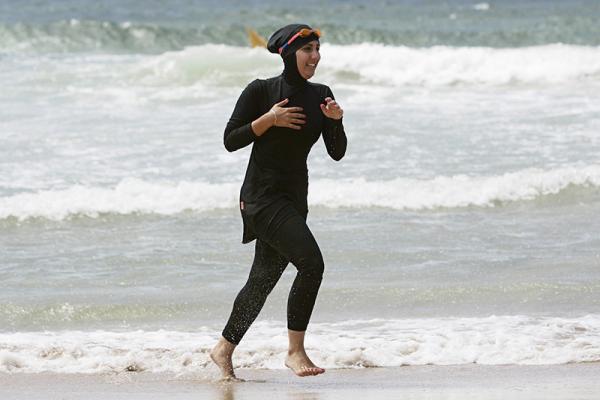Burkinis aren’t showing up at the beaches on either side of the English Channel yet, but the thought that the full head-to-ankle swimsuit might catch on among Muslim women in Europe has already sparked lively debates in Britain and France.
The modest Muslim beachwear, which looks like a loose-fitting wetsuit with a hoodie, has been around for about a decade. It has also been banned elsewhere, especially in public swimming pools in Europe and at some Moroccan beach resorts popular with foreign tourists.
But most non-Muslims in Europe are only finding out about it now because the popular British department store chain Marks & Spencer has just launched its own burkini line in Europe to appeal to a growing niche market for “Islamic fashion,” combining modern design with Muslim principles of modesty.
The arrival of burkinis in mainstream department stores has once again highlighted the differences between the pragmatic British approach toward multiculturalism and France’s determined efforts to fend off any challenges to its official policies of secularism.
There are about 2.7 million Muslims in Britain, or 4.5 percent of the population, and 5 million, or 8 percent of the population, in France.
Marks & Spencer has stores across Europe, Asia, and in the Middle East, where it has been selling burkinis for several years. Its online shop promotes two styles in English, French, German, Spanish, and Dutch.
House of Fraser, a rival British department store group, has come out with its own line. Both chains call the swimsuit “burkini,” a linguistic mashup of “burka” and “bikini,” but neither mentions religion in its advertising.
In the “nation of shopkeepers,” as Napoleon is said to have called Britain, the burkini’s defenders present it as a product that meets consumer demand.
“We have sold this item for a number of years and it is popular with our customers internationally,” a Marks & Spencer spokeswoman said.
The conservative tabloid Daily Mail called it “the ultimate proof Britain is truly multicultural” and noted that labels such as H&M, DKNY, Mango, and Uniqlo had recently launched Muslim-themed fashion collections.
Some critics decried the swimsuit as sexist; one asked why women had to “dress up like frogmen.” But others defended the right of Muslim women to choose.
“If I want to buy a burkini from M&S, I bloody well will,” journalist Remona Aly wrote in an op-ed for the liberal Guardian newspaper.
Across the channel in France, where the government worries about any sign that its Muslim minority is not fully adapting to the French way of life, the issue quickly escalated into political polemics that presented the burkini as the first step toward women’s oppression and Muslim radicalism.
Women’s Rights Minister Laurence Rossignol said: “Sure, there are women who choose it, and there were American negroes who were for slavery.” She quickly apologized for using the word “negroes” but stood by her message.
Prominent feminist Elisabeth Badinter called for a boycott of shops that promote Islamic fashions. She said the French have forgotten their founding principle of equality for all, independent of faith, ethnicity or gender, and hesitate to criticize Muslims who stress their minority group status.
“We shouldn’t be afraid of being called Islamophobes,” she argued. The French left has been too tolerant of Muslim communities that force their women to cover their hair and come up with novelties like the burkini, she said.
Prime Minister Manuel Valls linked Muslim fashion to the strict Salafi movement, whose extreme fringe inspired the violent attacks in Paris last year, killing 147 people.
At a conference on April 4, he said Muslim veils were not a fashion statement but “an enslavement of women” and declared that Salafism, which he described as a path to terrorism, might only represent 1 percent of French Muslims but was “winning the ideological and cultural battle” among them.
Muslim community leaders complained that this tarred all Muslims with the terrorist brush, but their exasperated reactions got little coverage in the French media.
Valls rarely speaks so bluntly about his concern that French society is being challenged by some of the country’s Muslims who identify more as a discriminated religious minority than with the republic’s universalist ideals of equality and secularism.
Rooted in its 1789 revolution, these ideals have become France’s civil religion, and they frame the stronger French reaction to Muslim issues from the more flexible treatment they get in Britain.
The vigorous rejection of the burkini comes amid political tensions lingering from last year’s bloody attacks and the government’s frustrated efforts to counter the radicalization that led to it.
Only last week, President François Hollande had to abandon a tough law-and-order bill he and Valls suggested last November. The proposed law would have stripped French citizenship from terrorists who have a second passport, a small category of people who will be mostly Muslim immigrants.
The conservative opposition and even important parts of his own Socialist Party rejected Hollande’s plan.
Air France touched this raw nerve recently when it advised stewardesses working on a newly reopened Paris-Tehran route that they would have to cover their hair and wear pants on arrival in Iran. Staff unions protested until the airline announced that only women who volunteer for the flights would be assigned to them.
Got something to say about what you're reading? We value your feedback!
